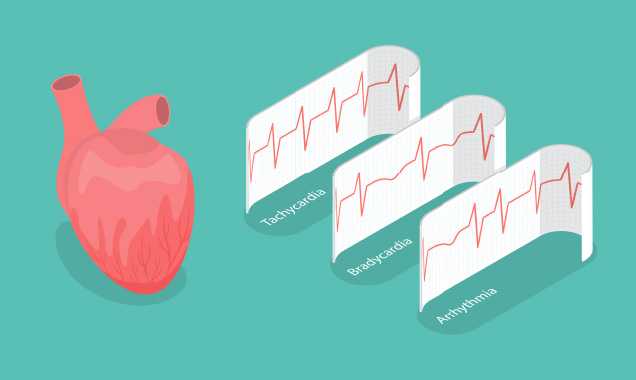
Arrhythmia
What is an arrhythmia?
What is an arrhythmia?
A heart arrhythmia is an irregular heartbeat. It happens when the electrical signals that control your heart’s rhythm do not work properly - causing the heart to beat too fast, too slow, or in an uneven pattern. Some arrhythmias may feel like a fluttering or racing heart and are harmless, while others can lead to serious health problems. It is normal for the heartbeat to change during sleep or exercise, but ongoing irregular rhythms may need medical attention.

Types of Arrhythmias
Depending on cardiac activity, several arrhytmia types may be described:
- Tachyarrythmias – invloving a rapid heartbeat (over 100 beats per minute), including conditions such as atrial fibrillation (AFib), which is a common type of arrhythmia that increases the risk of ischemic stroke.
- Bradyarrhythmia – a slow heartbeat (below 50–60 beats per minute). In healthy individuals, it often does not pose a problem, but it may cause fatigue or dizziness and can also be a sign of more serious rhythm disturbances, such as atrioventricular block.
- Premature contractions – extra beats that may feel like a missed heartbeat and can cause the sensation of a prolonged pause in the heart’s rhythm. They are usually harmless, but in certain clinical situations they may lead to advanced arrhythmias or worsening of symptoms in individuals with heart disease.

Causes, Risks & Treatment
Causes, Risks & Treatment
Arrhythmias can be caused by many factors, including heart disease, high blood pressure, thyroid issues, sleep apnea, or even stress, alcohol, or caffeine. Symptoms may include palpitations, fatigue, dizziness, or fainting—but sometimes, arrhythmias have no noticeable signs.
Treatment options vary based on the type and severity of arrhythmia. These may include medications, implantable devices like pacemakers, or procedures like catheter ablation. A heart-healthy lifestyle, regular exercise, good sleep, and managing stress can help prevent or reduce the risk of arrhythmias.

We Care About Your Privacy
Medinice S.A. uses cookies to improve and customize users experience on our website. By selecting 'Accept', you consent to the use of all cookies that gather and use information about your interactions with our site to provide personalized content and enhance your digital experience. Please read our Privacy Policy for more information.